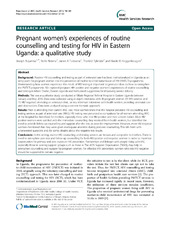| dc.contributor.author | Rujumba, Joseph | en_US |
| dc.contributor.author | Neema, Stella | en_US |
| dc.contributor.author | Tumwine, James K. | en_US |
| dc.contributor.author | Tylleskär, Thorkild | en_US |
| dc.contributor.author | Heggenhougen, Harald K. | en_US |
| dc.date.accessioned | 2014-05-09T07:04:27Z | |
| dc.date.available | 2014-05-09T07:04:27Z | |
| dc.date.issued | 2013-05-24 | eng |
| dc.identifier.issn | 1472-6963 | |
| dc.identifier.uri | https://hdl.handle.net/1956/7919 | |
| dc.description.abstract | Background: Routine HIV counselling and testing as part of antenatal care has been institutionalized in Uganda as an entry point for pregnant women into the prevention of mother-to-child transmission of HIV (PMTCT) programme. Understanding how women experience this mode of HIV testing is important to generate ideas on how to strengthen the PMTCT programme. We explored pregnant HIV positive and negative women’ s experiences of routine counselling and testing in Mbale District, Eastern Uganda and formulated suggestions for improving service delivery. Methods: This was a qualitative study conducted at Mbale Regional Referral Hospital in Eastern Uganda between January and May 2010. Data were collected using in-depth interviews with 30 pregnant women (15 HIV positive and 15 HIV negative) attending an antenatal clinic, six key informant interviews with health workers providing antenatal care and observations. Data were analyzed using a content thematic approach. Results: Prior to attending their current ANC visit, most women knew that the hospital provided HIV counselling and testing services as part of antenatal care (ANC). HIV testing was perceived as compulsory for all women attending ANC at the hospital but beneficial, for mothers, especially those who test HIV positive and their unborn babies. Most HIV positive women were satisfied with the immediate counselling they received from health workers, but identified the need to provide follow up counselling and support after the test, as areas for improvement. However, most HIV negative women mentioned that they were given inadequate attention during post-test counselling. This left them with unanswered questions and, for some, doubts about the negative test results. Conclusions: In this setting, routine HIV counselling and testing services are known and acceptable to mothers. There is need to strengthen post-test and follow up counselling for both HIV positive and negative women in order to maximize opportunities for primary and post exposure HIV prevention. Partnerships and linkages with people living with HIV, especially those in existing support groups such as those at The AIDS Support Organization (TASO), may help to strengthen counselling and support for pregnant women. For effective HIV prevention, women who test HIV negative should be supported to remain negative. | en_US |
| dc.language.iso | eng | eng |
| dc.publisher | BioMed Central | eng |
| dc.relation.ispartof | <a href="http://hdl.handle.net/1956/6277" target="blank">The Social Context of Prevention of Mother to Child Transmission of HIV (PMTCT) in Uganda</a> | eng |
| dc.rights | Attribution CC BY | eng |
| dc.rights.uri | http://creativecommons.org/licenses/by/2.0 | eng |
| dc.title | Pregnant women's experiences of routine counselling and testing for HIV in Eastern Uganda: a qualitative study | en_US |
| dc.type | Peer reviewed | |
| dc.type | Journal article | |
| dc.date.updated | 2013-08-23T08:49:53Z | |
| dc.description.version | publishedVersion | en_US |
| dc.rights.holder | Joseph Rujumba et al.; licensee BioMed Central Ltd. | |
| dc.rights.holder | Copyright 2013 Rujumba et al.; licensee BioMed Central Ltd. | |
| dc.source.articlenumber | 189 | |
| dc.identifier.doi | https://doi.org/10.1186/1472-6963-13-189 | |
| dc.identifier.cristin | 1046361 | |
| dc.source.journal | BMC Health Services Research | |
| dc.source.40 | 13 | |

